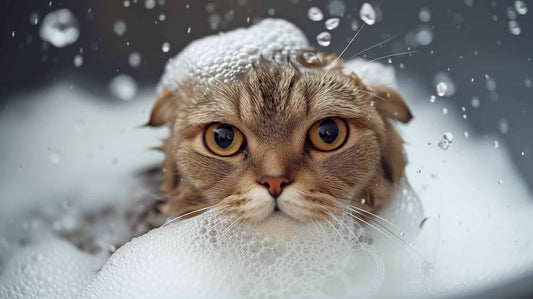
The Most Common Health Issues in Cats
Marie DuchessCats are beloved pets that bring joy and companionship to millions of people around the world. However, just like humans, cats can experience health issues that can affect their well-being. As a responsible cat owner, it's important to be aware of the most common health issues in cats so that you can provide the best care for your furry friend. In this blog post, we will explore some of the most prevalent health issues in cats and provide valuable information to help you keep your cat healthy and happy.
What are the signs of dental disease in cats?
Dental disease is a common health issue in cats, affecting up to 85% of cats over the age of three. Some signs of dental disease in cats include bad breath, difficulty eating, drooling, and swollen gums. If left untreated, dental disease can lead to more serious health problems, such as infections and tooth loss. Regular dental check-ups and proper dental care, such as brushing your cat's teeth and providing dental treats, can help prevent dental disease in cats.
How can you prevent obesity in cats?
Obesity is a growing concern among cats, with an estimated 60% of cats being overweight or obese. Obesity can lead to a variety of health issues, including diabetes, arthritis, and heart disease. To prevent obesity in cats, it's important to provide a balanced diet, control portion sizes, and encourage regular exercise. Avoid feeding your cat excessive treats or table scraps, as these can contribute to weight gain. Consult with your veterinarian to determine the appropriate diet and exercise plan for your cat.
What are the symptoms of urinary tract infections in cats?
Urinary tract infections (UTIs) are common in cats, especially in female cats. Some symptoms of UTIs in cats include frequent urination, urinating outside the litter box, blood in the urine, and excessive licking of the genital area. If you notice any of these symptoms, it's important to seek veterinary care, as UTIs can be painful and may lead to more serious complications if left untreated. Providing fresh water, a clean litter box, and a balanced diet can help prevent UTIs in cats.
How can you prevent fleas and ticks in cats?
Fleas and ticks are common parasites that can cause discomfort and health issues in cats. To prevent fleas and ticks, it's important to use a veterinarian-recommended flea and tick preventive, such as topical treatments or oral medications. Regular grooming and thorough cleaning of your cat's bedding and environment can also help prevent infestations. If you notice any signs of fleas or ticks on your cat, consult with your veterinarian for appropriate treatment options.
What are the signs of respiratory infections in cats?
Respiratory infections, such as the common cold or feline upper respiratory infection (URI), are common in cats, especially in multi-cat households or shelters. Some signs of respiratory infections in cats include sneezing, coughing, nasal discharge, and watery eyes. If your cat shows any of these symptoms, it's important to seek veterinary care, as respiratory infections can be contagious and may require medical treatment. Keeping your cat's living environment clean and providing proper nutrition can help prevent respiratory infections.
By being aware of the most common health issues in cats and taking proactive measures to prevent and address them, you can ensure that your feline companion enjoys a long and healthy life. Remember to schedule regular veterinary check-ups and consult with your veterinarian if you have any concerns about your cat's health. With proper care and attention, you can help your cat thrive and continue to be a source of joy in your life.













